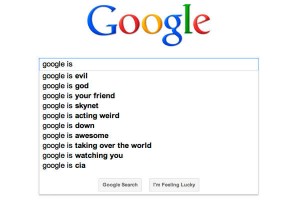When I first learned of the filter bubble, a result of Google’s data mining abilities, I felt internally conflicted. Part of me loved the fact that today’s technology is so advanced that we can track people’s moves online to tailor the world of information to individual particular needs. At the same time, I worried about what corporations or governments might do with that information. Also, part of me worried that over time I would be shut out to new possibilities, new viewpoints, and new ideas. So, I turned to my friends, hoping they could help give me some perspective. As it turns out, they too, were largely unaware of Google’s data mining ability and its implications, both positive and negative. Finally, I turned to the internet, hoping bloggers and tweeters alike could shed some light on the issue. What I found was that users were less concerned with the filter bubble aspect of data mining and concerned with its security implications.
After navigating through various links, I stumbled upon two very insightful articles that help explain the security threats associated with private companies’ access to user data. First, the Guardian points out that users do not have an opt-out option—from Google or virtually any other website that tracks data. Secondly, while this fact may be troubling for the average American, it proves very dangerous to CIA operatives, FBI agents, and undercover cops, etc. who cannot afford to be outed by clever hackers or by companies selling data to the highest bidder. Thus, the article states that new laws must be put in place to allow regular users to opt-out of data tracking and stringently forbid any tracking of government employees. On the other side of this issue, is the fact that governments themselves (while wanting to stay anonymous on the web), have been working diligently with other governments to hack into Google’s fiber-optic cables and steal data, as reported by the New York Times.
 Just recently, this issue of data mining came up again as Facebook purchased “WhatsApp,” for a grand total of $16 billion, its largest-ever purchase. (In comparison, Instagram cost Facebook just $1 billion). Facebook, of course, bought this app as it boasts 450 million users, 70% of whom use it daily. Thus, WhatsApp is a nice addition to Facebook’s social media repertoire. What is more curious, though, is the fact that Facebook does not plan to infiltrate advertising into this new app, which only charges an annual .99 cent fee. In fact, Mark Zuckerberg stated that Facebook has no initial plan of how to make profit from the app at all. Thus, NBC points to the vast amount of money which can be made from selling the data of those 450 million international users. NBC states that it is precisely these data mining possibilities which make the app so lucrative, especially when one considers the app’s lax privacy policy, the extent of its use, and its relatively low profits.
Just recently, this issue of data mining came up again as Facebook purchased “WhatsApp,” for a grand total of $16 billion, its largest-ever purchase. (In comparison, Instagram cost Facebook just $1 billion). Facebook, of course, bought this app as it boasts 450 million users, 70% of whom use it daily. Thus, WhatsApp is a nice addition to Facebook’s social media repertoire. What is more curious, though, is the fact that Facebook does not plan to infiltrate advertising into this new app, which only charges an annual .99 cent fee. In fact, Mark Zuckerberg stated that Facebook has no initial plan of how to make profit from the app at all. Thus, NBC points to the vast amount of money which can be made from selling the data of those 450 million international users. NBC states that it is precisely these data mining possibilities which make the app so lucrative, especially when one considers the app’s lax privacy policy, the extent of its use, and its relatively low profits.
So, whether your internet doings be tracked to tailor your search results and “bubble” you, hacked by governments who want to monitor you, or sold by huge corporations like Facebook to other corporations who want your business—the fact is, it’s happening whether you want it to or not. While other countries may set in place opt-out measures to protect its citizenry, the U.S. has failed to put in place any rigorous privacy policies. So, as data mining becomes ever more sought-after and ever more lucrative, we must ask ourselves: Should all citizens, regardless of criminal and civil history, be able to opt-out of data tracking? Should governments have unrestricted access to data while remaining anonymous themselves? Who has the authority to regulate this data which transcends any national borders?



Great questions! I was very interested in Eli Pariser’s call in his TED Talk for the people in power at companies like Facebook and Google to “humanize” their algorithms, or develop a code of ethics like he says journalists had to do at the beginning of the twentieth century. All the questions you bring up point to the fact that the information on the internet (and the algorithms that control it) are unwieldy in comparison to the information being produced by journalists in 1915.
I agree… good questions! I am interested in the degree to which people can “opt out” of having elements of their lives tracked. Today, you have to be incredibly diligent to avoid having elements of your life tracked online, by Google or by other services.